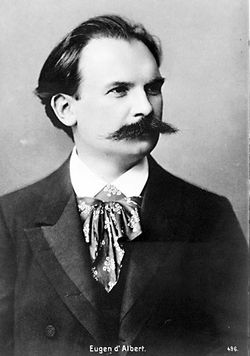Annotation:King Pippin Polka (1): Difference between revisions
m (Andrew moved page Annotation:King Pippin Polka to Annotation:King Pippin Polka (1)) |
No edit summary |
||
| Line 1: | Line 1: | ||
---------- | |||
---- | {{TuneAnnotation | ||
|f_tune_annotation_title= https://tunearch.org/wiki/Annotation:King_Pippin_Polka_(1) > | |||
'''KING PIPPIN POLKA'''. AKA and see "[[I'll Tell Me Ma]]," "[[My Auntie Jean]]." English, Polka. England, Dorset. G Major (Kerr):D Major (Roche, Trim). Standard tuning (fiddle). AB (Roche): AABB (Kerr, Trim). The melody was composed by Charles D'Albert (1864–1932), a Glasgow-born pianist and composer who was a student of Franz Liszt. D'Albert became a naturalized German citizen (he was the son of a French/Italian father and an English mother, never spoke English fluently, and considered himself to be German) and composed 21 operas, a symphony, two piano concerti, and numerous lesser works. Peter Kennedy says children sing words to the tune, beginning: "My mother says I never should play with gipsies in the wood." See also D'Albert's "[[Sweetheart's Waltz]]." The | |f_annotation=[[File:d'albert.jpg|250px|thumb|right|Charles d'Albert]]'''KING PIPPIN POLKA'''. AKA and see "[[I'll Tell Me Ma]]," "[[My Auntie Jean]]." English, Polka. England, Dorset. G Major (Kerr):D Major (Roche, Trim). Standard tuning (fiddle). AB (Roche): AABB (Kerr, Trim). The melody was composed by Charles D'Albert (1864–1932), a Glasgow-born pianist and composer who was a student of Franz Liszt. D'Albert became a naturalized German citizen (he was the son of a French/Italian father and an English mother, never spoke English fluently, and considered himself to be German) and composed 21 operas, a symphony, two piano concerti, and numerous lesser works. Peter Kennedy says children sing words to the tune, beginning: "My mother says I never should play with gipsies in the wood." See also D'Albert's "[[Sweetheart's Waltz]]." The first strain of the polka is popular in Ireland as the first strain of the air for the song "[[I'll Tell Me Ma]]", recorded by the group Cherish the Ladies and others, which is also used as a polka. The first part of D'Albert's tune also appears as the second part of the English "[[Percy Brown's Polka]]." | ||
|f_source_for_notated_version= | |||
|f_printed_sources=Kerr ('''Merry Melodies, vol. 4'''), c. 1880's; No. 408, p. 45. | |||
Kerr ('''Merry Melodies, vol. 4'''), c. 1880's; No. 408, p. 45. | |||
McDermott ('''Allan's Ballroom Companion'''), c. 1920's; p. 9. | McDermott ('''Allan's Ballroom Companion'''), c. 1920's; p. 9. | ||
Roche ('''Collection of Traditional Irish Music, vol. 2'''), 1912; No. 304 (appears as untitled tune in "Old 'Set' Tunes" section). | Roche ('''Collection of Traditional Irish Music, vol. 2'''), 1912; No. 304 (appears as untitled tune in "Old 'Set' Tunes" section). | ||
Trim ('''Musical Heritage of Thomas Hardy'''), 1990; No. 77. | Trim ('''Musical Heritage of Thomas Hardy'''), 1990; No. 77. | ||
|f_recorded_sources= | |||
|f_see_also_listing= | |||
}} | |||
------------- | |||
---- | |||
Revision as of 19:33, 18 August 2021
X:1 T:King Pippin Polka [1] M:2/4 L:1/8 S:Kerr - Merry Melodies, vol. 4, No. 408 (c. 1880's) Z:AK/Fiddler's Companion K:G DD/G/ B2|cc/>E/ B2|BA A/B/A|AG G/A/G| DD/G/ B2|cc/E/ B2|BA A/B/A|GBGz:| |:d/d/d D/D/D|ED D/E/D|BA A/B/A|AG G/A/G| d/d/d D/D/D|ED D/E/D|BA A/B/A|GBGz:|


